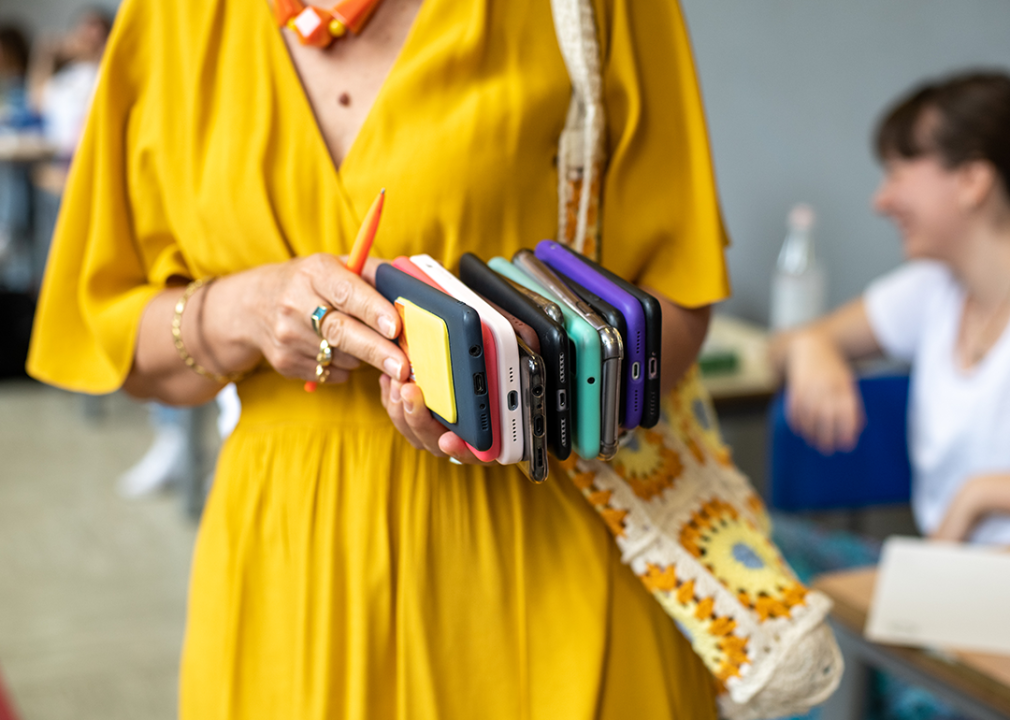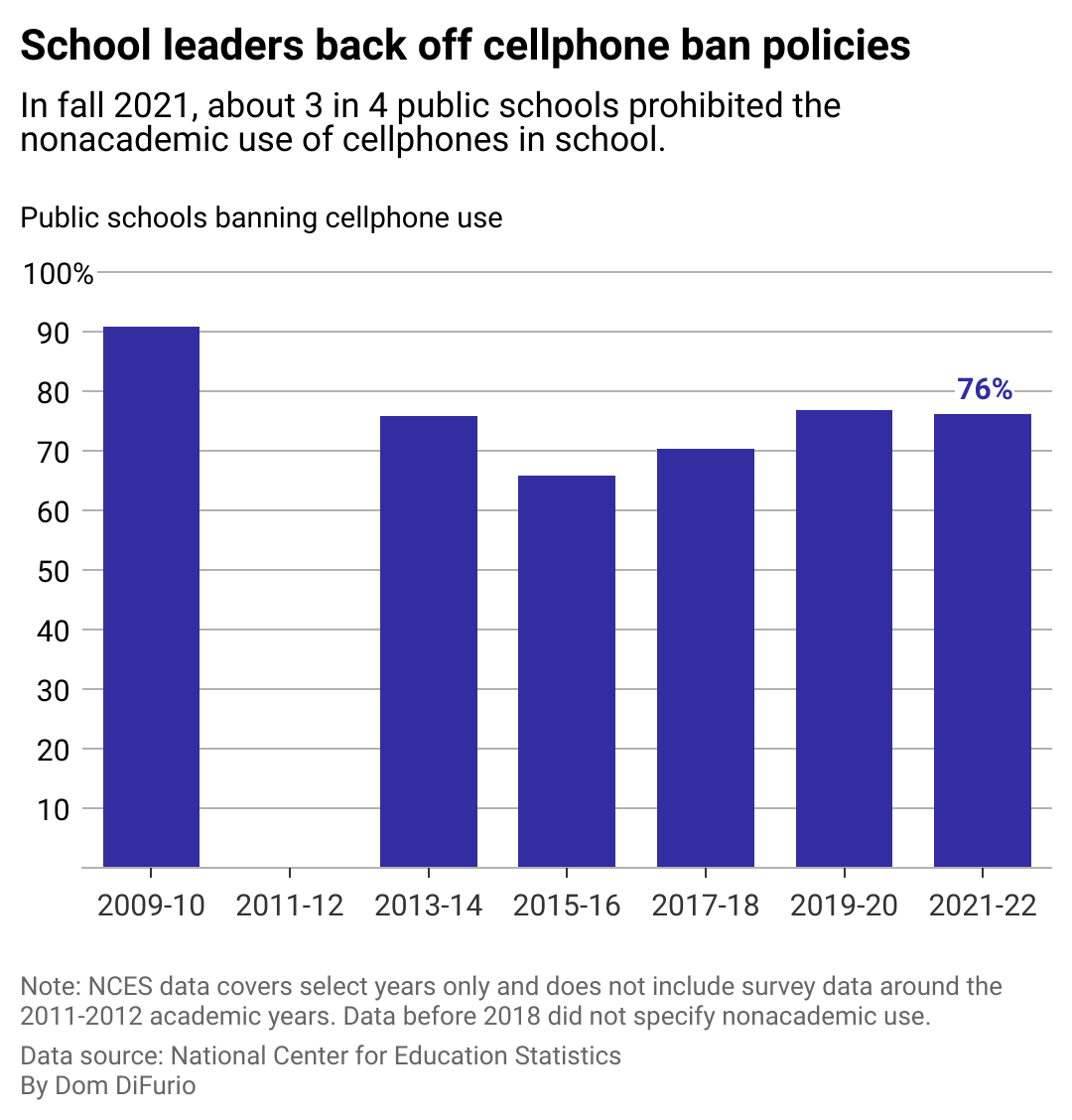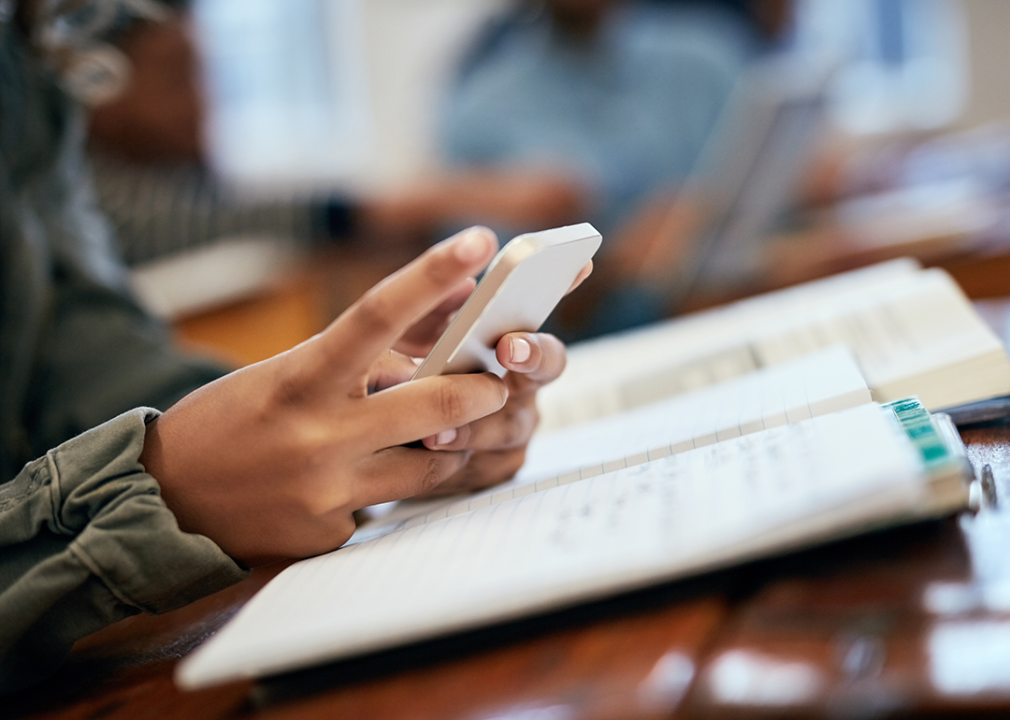HeyTutor looked at NCES data, surveys, and state and local laws and policies to illustrate how the movement to limit school phone usage is growing.
This item is available in full to subscribers.
If you are a current print subscriber, you can set up a free website account by clicking here.
Otherwise, click here to view your options for subscribing.
Please log in to continue |
|

Concerns over youth mental health and academic performance are driving lawmakers to revive a decades-long debate in public schools: how to keep kids off their phones in the classroom.
Florida moved first in the summer of 2023 by passing a law requiring all schools to prohibit cellphone use during school days, prohibiting social media use on schools' internet, and requiring that grades 6-12 learn about the "social, emotional, and physical effects of social media."
Now, dozens of state legislatures are proposing or getting ready to enforce policies restricting phone use at school.
The renewed attention on school smartphone use among students intensified earlier this year with the release of social psychologist Jonathan Haidt's New York Times Bestseller, "The Anxious Generation." Haidt's book argues there is a direct link between the increase in smartphone and social media use and the declining mental health of American adolescents—teenage girls, in particular. Centers for Disease Control and Prevention data from 2021 suggested that 1 in 3 teenage girls considered attempting suicide, up nearly 60% from a decade prior. Poor mental health among adolescents has grown considerably from 2010 to the present day, per CDC data, and much of it occurred before the pandemic period.
Critics of Haidt's conclusions have pointed out that suicide rates are increasing among almost all age groups, that the studies Haidt cites often rely on bad science, and other psychologists have likened his arguments to the moral panic over violent video games and other technological evolutions.
HeyTutor looked at National Center for Education Statistics data and state legislation regarding school cellphone bans to show how policies have shifted since the advent of smartphones more than a decade ago as state leaders say they're willing to take action where schools haven't.
Politicians advancing phone restriction laws, like New York Gov. Kathy Hochul, have described Haidt's work as influential but said they also understand parents' fears for their children in an era of school shootings and the desire to be connected to them.
"You don't need to see another school shooting, a mass shooting, and have that fear of your most precious person in your whole life, something could happen [to] them," Hochul said in a May MSNBC appearance.
The concern about students' academic achievement and safety amid worsening mental health statistics is palpable among parents and teachers. In 2023, parents surveyed by the Pew Research Center listed mental health as the top concern for their kids, surpassing bullying and drugs and alcohol.
In the aftermath of school reopenings, teachers have reported their students' cellphone use becoming disruptive to the classroom. Nearly 3 in 4 (72%) high school teachers in the United States reported cellphone distractions as a major problem, according to a fall 2023 Pew survey.

The debate over phones' place in educational spaces stretches back even further than NCES data measures—to the aftermath of the Columbine school shooting in 1999 and the Sept. 11 attacks in 2001, according to school security consulting firm National School Safety and Security Services.
The organization advises that phones can be disruptive to learning. While many parents view them as a convenient way to reach children in a crisis, they also present security threats.
As technology advanced from pagers and flip phones to smartphones and wearables such as smartwatches and fitness trackers, most schools still maintain policies prohibiting personal, nonacademic cellphone use in school. Over the last decade, however, the proportion of schools with those policies has fallen from 9 in 10 schools prohibiting use in 2010 to 7 in 10 in 2022, according to NCES survey data.
Phones have become entrenched in young people's lives, much like adults, and enforcing policies restricting their use can be onerous for teachers. Some schools have implemented cubby-style pouches mounted on classroom walls where teachers can place phones inside during instruction time. Others have tried to enforce restrictions as they notice students using phones at inappropriate times.
And as lawmakers consider restrictions, they aren't all on the same page as parents, even if those parents are concerned about social media's impact on kids.
In surveys, most parents expressed they don't want schools confiscating their kids' cellphones. Over half (56%) of parents said their children should sometimes be allowed to use phones during school hours, including during lunch and recess, according to a March survey from the National Parents Union. They want to be able to communicate with their kids about emergencies, transportation to and from school, mental health needs, and conveniently coordinate things like doctor's appointments.
"The concerns of American parents are real and deserve to also be considered in the creation of any policy that impacts our ability to communicate with our children," National Parents Union President Keri Rodrigues said in a September statement.

Lawmakers and state boards of education in more than a dozen states have already passed laws and policies stipulating limitations on cellphone use in school, according to Education Week. Many of those laws and policies will become effective throughout the latter half of the 2024-25 school year and into the next.
Four states now have laws that require publicly funded schools to adopt policies limiting phone use in schools, including Indiana, Minnesota, Virginia, and Ohio. Three other state boards of education in Alabama, Connecticut, and Washington have only recommended that schools create policies.
Arkansas, Delaware, and Pennsylvania lawmakers have incentivized schools to limit cellphone use. In Pennsylvania, the law provides grant funding for schools to buy locking smartphone bags.
Only two other states have joined Florida in passing laws that place statewide restrictions on cellphone use. Louisiana updated existing limits on phones to require students to power them off during school hours. South Carolina has made state funding incumbent on the state board of education to create a policy prohibiting phone use during the school day.
Another 14 states have introduced legislation proposing restrictions for their schools, according to KFF.
Some school districts have already moved to enact phone restrictions on their own over the years—a pattern that's continued as legislators debate codifying them in law. National School Safety and Security Services President Ken Trump advocates for this method for determining school policies in his work consulting with schools.
"Generally speaking, I believe there is a trend of over-legislating school safety," Trump said in a statement shared with Stacker. "Cellphones in schools is a complex, polarized problem with legitimate arguments, pro and con. Meaningful policies are best developed from the bottom up at the school-community level rather than top-down mandates from statehouses."
In Orange County, Florida, the school district implemented its own policy banning phones, smartwatches, and earbuds in 2023 before the state began enforcing one this July. Teachers there report that kids were more focused on lessons and were even caught passing handwritten notes during class.
Story editing by Alizah Salario. Additional editing by Kelly Glass. Copy editing by Paris Close.
This story originally appeared on HeyTutor and was produced and distributed in partnership with Stacker Studio.